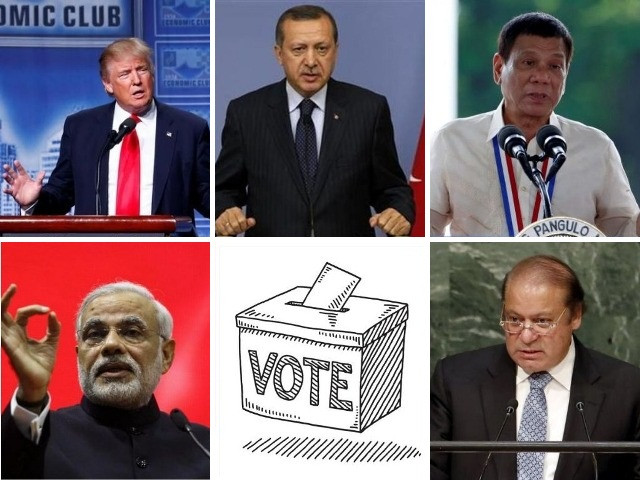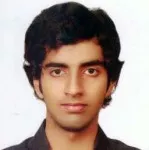The new millennium has hardly started, and already we are witnessing unsettling tectonic shifts in politics all over the world. One such example is the emergence of a covert, scheming approach towards attaining power, embodied by certain group of people, who under different circumstances, ended up occupying the highest seats of power in their respective countries.
We will pivot our discussion around five such individuals: Nawaz Sharif, Narendra Modi, Rodrigo Duterte, Recep Tayyip Erdogan and Donald Trump. Though each of them was elected to office democratically, ask any unbiased political analyst or academic, and they will invariably conclude that these five leaders have all the makings of great authoritarian dictators.
These Mughal kings and Czars of today have embraced a unique avatar. They operate under the alias of being the peoples’ representatives, but their actions sing a completely different tune. In varying degrees, they have flouted core constitutional rights of their people, and are doing a great disservice to all that democracy epitomises: safeguarding fundamental rights, ensuring accountability, and upholding transparency in governance.
Let’s look at some of the defining traits we find common within this group.
Firstly, they all ascended to power on the back of populist agendas. Be it the expulsion of Muslims and building border walls, fighting against drug mafias, or claims to end corruption, these men were shrewd enough to realise what frustrated their citizens the most. They failed to provide any holistic solutions to the underlying issues their nations face; they simply told the public exactly what it wanted to hear, and then cashed in on those innocent sentiments.
A cursory glance at their voter base shows that whether in Pakistan or the US, it was mostly the rural, right-leaning and underprivileged segments of society that voted in large numbers for the saviours of the destitute. They were the labourers, the factory workers and the land tillers. This was because these despots were quick to demonstrate their association to the downtrodden classes. Modi proudly associated himself with his modest past, knowing fully well that it will strike a chord with the populace; and till date, he has done little to eradicate the endemic poverty in India. Still, he remains the poster boy of the poor. Ironically, even billionaire Trump succeeded in cajoling the support of this class of people.
Another prominent theme is their method of statesmanship. These leaders are the very personification of one-man shows. The person on the top controls the parliaments, senates, committees and the rest of the bureaucracy. He offers the illusion of participation, but in reality, his word alone reigns supreme.
Dissent is something that is supposed to be central to the success of democratic societies. Yet, in the Pakistan Muslim League-Nawaz (PML-N) run government, does anyone have the courage to question any of the metro bus policies of the prime minister? Can anyone in Duterte’s administration challenge his inhumane treatment of drug addicts? In Trump’s case, even those who were opposed to his extreme ideas in the past have learnt to silently toe the line.
And when it comes to opposition from outside the party, the reaction is much more severe. Duterte, for example, does not believe in the house arrest policy that Nawaz imposed on Imran Khan; he simply jails or kills his opponents. As for Erdogan, he has till date conducted crackdowns on thousands of people who opposed his policies. Whoever tries to speak against the oppression of these autocratic men should be prepared to face the music, because, after all, they got the votes.
Similarly, these custodians of the democratic project have a knack for ardently suppressing any efforts towards institutional reform. This seems obvious, considering how they despise sharing power. Hence in Pakistan, as long as dictators like Asif Ali Zardari and Nawaz Sharif are around, there is no way we could have a corruption free National Accountability Bureau (NAB), an independent Federal Investigation Agency (FIA), a neutral Securities and Exchange Commission of Pakistan (SECP) or an impartial Federal Board of Revenue (FBR). Nepotism will remain the order of the day, with merit being the exception, not the rule. But institutional reforms or not, these despotic leaders will carry on, because after all, they got the votes.
However, it would be fatally wrong to blame democracy for this conundrum, because the alternative is even more dreadful. It is in fact the authoritarian outlook of these pseudo democrats that prevents this system from serving the people. Europe, North America, and Japan are shining examples of how democracy can work wonders, provided its essential principles are implemented in letter and spirit.
So, unless society as a whole is not well educated, and more importantly, well informed – because there is a vital distinction between the two concepts – such neo-autocrats will continue on their merry ways. And from their perspective, why should we expect them to disturb the status quo, and do things any differently? After all, they did get the votes.
What is so similar about Nawaz, Modi, Erdogan, Duterte and Trump?
They are all democratic dictators and ascended to power on the back of populist agendas.After all, they got the votes.

Though each of them was elected to office democratically, ask any unbiased political analyst or academic, and they will invariably conclude that these five leaders have all the makings of great authoritarian dictators.


COMMENTS
Comments are moderated and generally will be posted if they are on-topic and not abusive.
For more information, please see our Comments FAQ